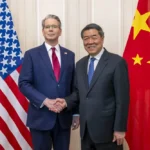
Canada has announced plans to significantly expand its military capabilities and reduce defense dependency on the United States through a comprehensive security investment strategy.
Prime Minister Mark Carney unveiled the new security investment plan Monday, proposing over $9 billion in additional military funding this fiscal year. The investment would enable Canada to meet NATO’s 2% defense spending target five years earlier than previously planned.
“I call on all parties in Parliament to support these critical investments in our security and sovereignty. Our plan will help ensure that Canada is strong at home and reliable abroad,” Carney stated. “We should no longer send three-quarters of our defense capital spending to America. We will invest in new submarines, aircraft, ships, armed vehicles and artillery, as well as new radar drones and sensors to monitor the sea floor and the Arctic.”
The investments will directly support the Canadian Armed Forces, Department of National Defence, and Communications Security Establishment, among other organizations.
Senior government officials briefed international reporters following Carney’s announcement, providing details about the funding increases. One official, speaking anonymously, explained that “the total defense spend for Canada was projected to have been $53.4 billion this fiscal year [but] today, with this new investment, that number is poised to grow to $62.7 billion.”
The plan allocates $560 million this year to expand the Canadian Armed Forces Cyber Command, modernize digital resources, and accelerate military AI deployments.
Officials outlined additional spending: “We will spend $1 billion this year on critical systems that will make Canada increasingly self-sufficient in defending our territory, our citizens, and especially in the Arctic. This includes the over-the-horizon radar, joint support ships, integrated underwater surveillance systems, logistics and light utility vehicles and domestic ammunition production, to mention a few.”
The investment strategy also prioritizes fleet maintenance, additional weapons, aircraft and armored vehicles, infrastructure modernization, and improved compensation for military personnel. Canada plans to build greater capacity in the quantum and space sectors.
“With our Five Eyes [alliance] partners, we’re very excited about the defense industrial strategy, because I think it will create new opportunities to work in secure and classified spaces that we haven’t had before,” a senior official said. The Five Eyes alliance comprises Canada, the United States, United Kingdom, Australia and New Zealand.
Regarding the Trump administration’s Golden Dome missile defense system plans, Canadian officials acknowledged it’s “certainly top of mind for a lot of Canadians.” However, they emphasized Canada’s focus on establishing integrated air-and-missile defense to protect Canadian territory and support North American Aerospace Defense Command (NORAD) commitments.
“In doing this investment, we’re going to protect our sovereignty and our country, but we’ll also be better partners in the NORAD enterprise, where we’ll be value-added to the gaps that NORAD has. So our focus is integrated air-and-missile defense — arguably a subset of the wider NORAD contribution that we’ve been doing for a long time — and we’ll watch and see how the wider U.S. approach to air-and-missile defense evolves,” the official explained.
Carney, who leads Canada’s Liberal party and was elected Prime Minister in April, campaigned on promises to counter President Trump’s tariffs and annexation rhetoric while strategically strengthening Canada’s military capabilities against contemporary threats.
“The brave women and men who are protecting our sovereignty do not have the resources they need for a riskier world. Our military infrastructure and equipment have aged, hindering our military preparedness. I’ll give an example or two. Only one of our four submarines is seaworthy. Less than half of our maritime fleet and land vehicles are operational. More broadly, we’re too reliant on the United States,” Carney said Monday.
Canada is scheduled to host Trump and other world leaders at the G7 summit in Alberta next week.












Be the first to leave a comment